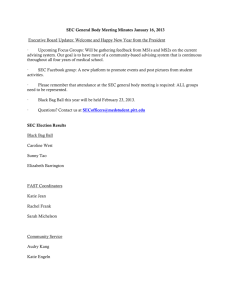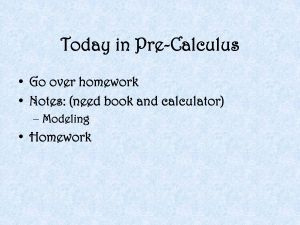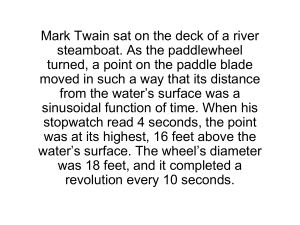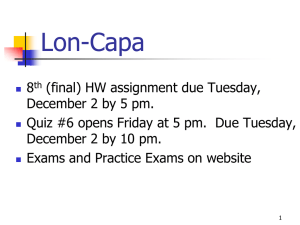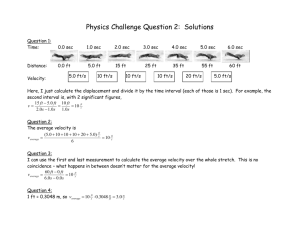sp2013 course schd.do+
advertisement
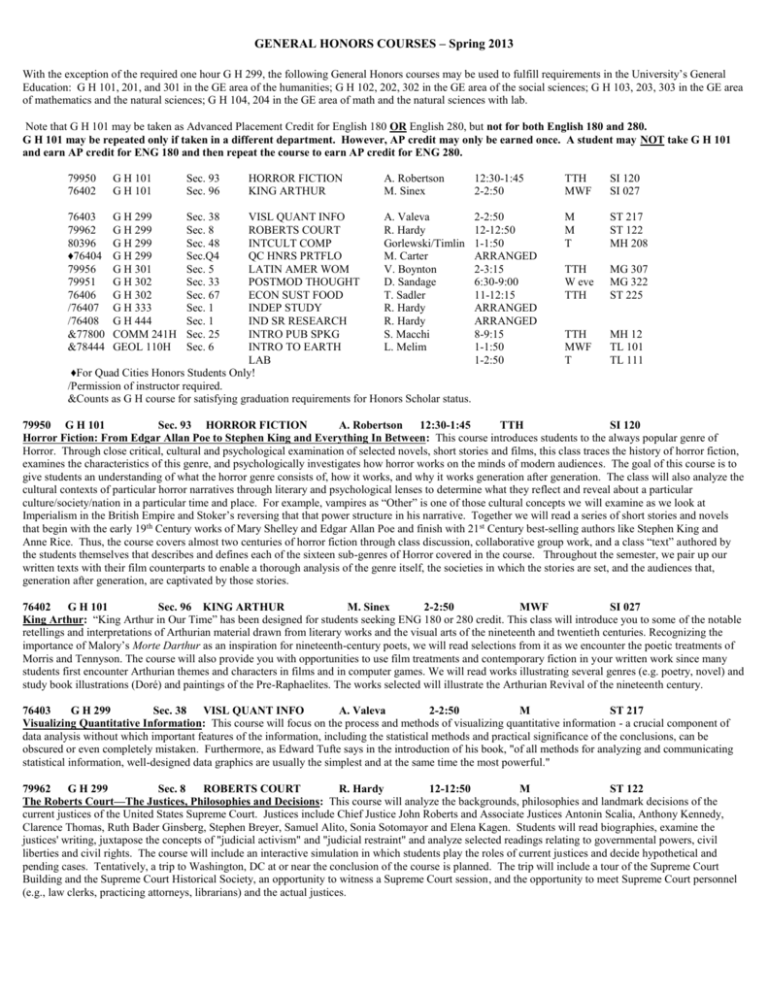
GENERAL HONORS COURSES – Spring 2013 With the exception of the required one hour G H 299, the following General Honors courses may be used to fulfill requirements in the University’s General Education: G H 101, 201, and 301 in the GE area of the humanities; G H 102, 202, 302 in the GE area of the social sciences; G H 103, 203, 303 in the GE area of mathematics and the natural sciences; G H 104, 204 in the GE area of math and the natural sciences with lab. Note that G H 101 may be taken as Advanced Placement Credit for English 180 OR English 280, but not for both English 180 and 280. G H 101 may be repeated only if taken in a different department. However, AP credit may only be earned once. A student may NOT take G H 101 and earn AP credit for ENG 180 and then repeat the course to earn AP credit for ENG 280. 79950 76402 G H 101 G H 101 Sec. 93 Sec. 96 76403 79962 80396 ♦76404 79956 79951 76406 /76407 /76408 &77800 &78444 G H 299 G H 299 G H 299 G H 299 G H 301 G H 302 G H 302 G H 333 G H 444 COMM 241H GEOL 110H Sec. 38 Sec. 8 Sec. 48 Sec.Q4 Sec. 5 Sec. 33 Sec. 67 Sec. 1 Sec. 1 Sec. 25 Sec. 6 HORROR FICTION KING ARTHUR A. Robertson M. Sinex 12:30-1:45 2-2:50 VISL QUANT INFO A. Valeva 2-2:50 ROBERTS COURT R. Hardy 12-12:50 INTCULT COMP Gorlewski/Timlin 1-1:50 QC HNRS PRTFLO M. Carter ARRANGED LATIN AMER WOM V. Boynton 2-3:15 POSTMOD THOUGHT D. Sandage 6:30-9:00 ECON SUST FOOD T. Sadler 11-12:15 INDEP STUDY R. Hardy ARRANGED IND SR RESEARCH R. Hardy ARRANGED INTRO PUB SPKG S. Macchi 8-9:15 INTRO TO EARTH L. Melim 1-1:50 LAB 1-2:50 ♦For Quad Cities Honors Students Only! /Permission of instructor required. &Counts as G H course for satisfying graduation requirements for Honors Scholar status. TTH MWF SI 120 SI 027 M M T ST 217 ST 122 MH 208 TTH W eve TTH MG 307 MG 322 ST 225 TTH MWF T MH 12 TL 101 TL 111 79950 G H 101 Sec. 93 HORROR FICTION A. Robertson 12:30-1:45 TTH SI 120 Horror Fiction: From Edgar Allan Poe to Stephen King and Everything In Between: This course introduces students to the always popular genre of Horror. Through close critical, cultural and psychological examination of selected novels, short stories and films, this class traces the history of horror fiction, examines the characteristics of this genre, and psychologically investigates how horror works on the minds of modern audiences. The goal of this course is to give students an understanding of what the horror genre consists of, how it works, and why it works generation after generation. The class will also analyze the cultural contexts of particular horror narratives through literary and psychological lenses to determine what they reflect and reveal about a particular culture/society/nation in a particular time and place. For example, vampires as “Other” is one of those cultural concepts we will examine as we look at Imperialism in the British Empire and Stoker’s reversing that that power structure in his narrative. Together we will read a series of short stories and novels that begin with the early 19th Century works of Mary Shelley and Edgar Allan Poe and finish with 21st Century best-selling authors like Stephen King and Anne Rice. Thus, the course covers almost two centuries of horror fiction through class discussion, collaborative group work, and a class “text” authored by the students themselves that describes and defines each of the sixteen sub-genres of Horror covered in the course. Throughout the semester, we pair up our written texts with their film counterparts to enable a thorough analysis of the genre itself, the societies in which the stories are set, and the audiences that, generation after generation, are captivated by those stories. 76402 G H 101 Sec. 96 KING ARTHUR M. Sinex 2-2:50 MWF SI 027 King Arthur: “King Arthur in Our Time” has been designed for students seeking ENG 180 or 280 credit. This class will introduce you to some of the notable retellings and interpretations of Arthurian material drawn from literary works and the visual arts of the nineteenth and twentieth centuries. Recognizing the importance of Malory’s Morte Darthur as an inspiration for nineteenth-century poets, we will read selections from it as we encounter the poetic treatments of Morris and Tennyson. The course will also provide you with opportunities to use film treatments and contemporary fiction in your written work since many students first encounter Arthurian themes and characters in films and in computer games. We will read works illustrating several genres (e.g. poetry, novel) and study book illustrations (Doré) and paintings of the Pre-Raphaelites. The works selected will illustrate the Arthurian Revival of the nineteenth century. 76403 G H 299 Sec. 38 VISL QUANT INFO A. Valeva 2-2:50 M ST 217 Visualizing Quantitative Information: This course will focus on the process and methods of visualizing quantitative information - a crucial component of data analysis without which important features of the information, including the statistical methods and practical significance of the conclusions, can be obscured or even completely mistaken. Furthermore, as Edward Tufte says in the introduction of his book, "of all methods for analyzing and communicating statistical information, well-designed data graphics are usually the simplest and at the same time the most powerful." 79962 G H 299 Sec. 8 ROBERTS COURT R. Hardy 12-12:50 M ST 122 The Roberts Court—The Justices, Philosophies and Decisions: This course will analyze the backgrounds, philosophies and landmark decisions of the current justices of the United States Supreme Court. Justices include Chief Justice John Roberts and Associate Justices Antonin Scalia, Anthony Kennedy, Clarence Thomas, Ruth Bader Ginsberg, Stephen Breyer, Samuel Alito, Sonia Sotomayor and Elena Kagen. Students will read biographies, examine the justices' writing, juxtapose the concepts of "judicial activism" and "judicial restraint" and analyze selected readings relating to governmental powers, civil liberties and civil rights. The course will include an interactive simulation in which students play the roles of current justices and decide hypothetical and pending cases. Tentatively, a trip to Washington, DC at or near the conclusion of the course is planned. The trip will include a tour of the Supreme Court Building and the Supreme Court Historical Society, an opportunity to witness a Supreme Court session, and the opportunity to meet Supreme Court personnel (e.g., law clerks, practicing attorneys, librarians) and the actual justices. 80396 G H 299 Sec. 48 INTCULT COMP Gorlewski/Timlin 1-1:50 T MH 208 Developing Intercultural Competence through International Education: This course will introduce the concept of intercultural competence, specifically as a desired outcome of international education activities. In today’s interconnected world, intercultural competence is increasingly seen as a requirement for college graduates to succeed in the global workforce. Students will learn about the different conceptions of what it means to be interculturally competent, and how this competence is developed both at home and abroad. ♦76404 G H 299 Sec. Q4 QC HNRS PRTFLO M. Carter ARRANGED Quad Cities Honors Portfolio: This class will be the introductory course for the Quad Cities Honors Program. The Honors program for this campus will focus on portfolio development reflecting mentored honors experiences on campus and in the community. Ways to create a portfolio will be explained, and the faculty available to mentor students will be introduced. ♦QUAD CITIES STUDENTS ONLY! 79956 G H 301 Sec. 5 LATIN AMER WOM V. Boynton 2-3:15 TTH MG 307 Women in Colonial Latin American History: This course is a readings and research seminar that explores the history of women in pre-colonial and colonial Latin America, focusing primarily on Mexico, Guatemala, Peru, Argentina, and Brazil. Students will analyze the impact of race and ethnicity on women’s experiences, through an examination of the lives of native American, African, Iberian, and casta (mixed-race) women in multiple countries. By focusing on the intersections of gender with religion, race, and nationality, students will uncover the ways in which definitions of gender evolved over the course of the late pre-colonial and colonial periods. The course will culminate in the class presentation of research that each individual student will have undertaken on a specific aspect of colonial Latin American women’s history. All assigned course readings will be in English. 79951 G H 302 Sec. 33 POSTMOD THOUGHT D. Sandage 6:30-9:00 W eve MG 322 Postmodern Thought: Using sociological analysis, this course examines postmodernism. It will focus on how postmodernism is both the continuation of modernism and its transcendence. The course will specifically explore the roots of postmodernism, postmodern theory, the effects of language and power systems on ideas and beliefs, the complex process of constructing reality, how different societies create different values and beliefs, and how humans relate to their symbolic environment. An emphasis will be placed on the following dimensions of the postmodern world; self-concept, moral and ethical discourse, art and culture, and globalization. The complexities of postmodern thought, including constructivism, deconstruction, irony, pluralism, and multiculturalism will be analyzed. The numerous criticisms of postmodern theory and postmodern thought will also be evaluated. 76406 G H 302 Sec. 67 ECON SUST FOOD T. Sandler 11-12:15 TTH ST 225 Sustainable Food: Most people in our society do not have the time or the inclination to understand the process of food production. By examining the current state of industrial agriculture in this country, its historical context, the economic model in which it persists, and the alternative model of sustainable, local food production, this course makes the process clear. Today, in the United States, industrial agriculture provides the majority of the meat and produce that we consume. Incredibly, we as a society are separated from and, for the most part, uninterested in this industrial process that gives us sustenance. Many pernicious outcomes, or “negative externalities,” result from this reality. Soil fertility diminishes. Without the use of chemical applications, the plants we consume are vulnerable to pests and disease. Obesity inhibits advances in health. Multi-billion dollar agricultural subsidies prop up an inferior economic system of monoculture. The system relies on imported energy, which contributes to global warming. Alternatively, sustainable, local food production, which is growing as a share of total food production, addresses each of these problems. It also leads to many positive outcomes, including local employment and healthier food. Most importantly, however, sustainable agriculture, such as local, organic farming, leads to greater knowledge of the crucial connection between food production and consumption and thereby addresses what Wendell Berry calls “the great destructiveness of the industrial age…a division, a sort of divorce, in our economy.” /76407 G H 333 Sec. 1 INDEP STUDY R. Hardy Arranged Arranged Arranged Intensive study and writing on interdisciplinary topics to be approved by the Honors College director and faculty supervisors. Students must have upperdivision status. See the Honors Director for more details. /Instructor’s permission required. /76408 G H 444 Sec. 1 INDEP SR RESEARCH R. Hardy Arranged Arranged Arranged Intensive research and preparation of an interdisciplinary senior honors thesis or project report. Topics to be approved by the Honors College director and faculty supervisor. See the Honors Director for more details. (Note: students working on senior theses should use course numbers available in their major departments. GH 444 can be used if no departmental course number exists.) /Instructor’s permission required. &77800 COMM 241H Sec. 25 INTRO PUB SPKG S. Macchi 8-9:15 TTH MH 12 Introduction to Public Speaking: Students in this honors class will receive the same amount of speaking experience and practical instruction as in other sections but will engage in a more intensive development of those speeches. Each student will give three major speeches. The first will be an informative visual presentation, the second will be an argumentative presentation, and the third major speech will be a persuasive presentation. Students will also deliver some minor, upgraded speeches. The course has two objectives. The first is to have the students master the practicalities of public speaking. They will learn and put into play the canonical principles of invention, organization, style, memory and delivery, and will do so in both informative and persuasive situations. The second objective is to introduce students to the richness of rhetorical theory. The section will be conducted in such a way as to promote both goals simultaneously. Speeches will be critiqued by the instructor and the class according to the principles outlined in the texts and discussed in class. With the exception of the days devoted to giving speech assignments, class will be conducted as a seminar and workshop. Students will be expected to have read the material assigned and be prepared to raise issues about the readings. Discussion will follow the students' reactions. &Counts as GH course for satisfying graduation requirements for Honors Scholar status. &78444 GEOL 110H Sec. 06 INTRO TO EARTH L. Melim 1-1:50 MWF TL 101 ALSO MEETS 1-2:50 T TL 111 Introduction to the Earth: The course is devoted to the study of the earth, its composition, structure, landscape development, origin and evolution. Laboratory includes minerals, rocks and maps. &Counts as GH course for satisfying graduation requirements for Honors Scholar status.




